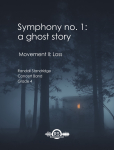Komponist:
Sormani, Angelo Besetzung:
Blasorchester
Genre:
Konzertstück • Originalwerk Produktart:
Partitur • Stimmensatz Spring Tour is a joyful musical trip that depicts lights, colors, and atmospheres of spring. This composition continues the collection started with Winter Tour, a piece that described the months of January, February, and March. Every movement of the collection portrays a month of the year and is built around one of the twelve intervals of the octave. The intervals used in this piece are the major third for the month of April, the perfect fourth for the month of May, and the augmented fourth for June. This basic compositional choice is gradually joined by new features that determine the musical language of each single movement: rhythmic variety, different phrasings and articulations, as well as a label (for instance ''Moons of May'') that adds programmatic intent and another layer of meaning. Movement I: Festa d'Aprile (April Feast) Outdoor plays and activities greet the coming of spring in the month of April. Ascending and descending thirds give brilliance and joy to the principle melodic line, which develops throughout the movement by rendering different colors and lights of increasing intensity. The beam of light of the cold winter nights now carries life and warmth. Movement II: Lune di Maggio (Moons of May) Halfway between spring and summer, the lunar phase cycle of May has a fundamental role in the growth of the plant kingdom. Nature is hyperactive in this month and the cycle of life is reaching its peak. The interval of a perfect fourth, accompanied by a suspension, characterizes the magic and the fascination of these moments. Movement III: Danze Diaboliche (Diabolic Dances) June is the month of the sun. The summer solstice falls on its twenty-first day, when the axial tilt of the earth reaches such an inclination that allows for the longest period of daylight of the year. In ancient times, the heat, fire, and energy of this event gave way to dances and religious rituals to celebrate important socio-cultural moments. Languid and striking rhythms narrate legends and love tales and pray to the god of fertility. Other dances, more agitated and dogged, pay homage to the mystery of the creation of life and chase away evil and death. The augmented fourth, also known as diabulus in musica or tritone is the characteristic label of this movement. The tritone is exactly in the middle of the octave and it is here associated with June, the month that ends the first half of the year.
Folgende Optionen können gewählt werden um diese Ausgabe zu konfigurieren:



